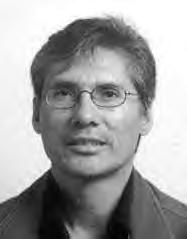|
 When
Matthew Coon Come grew up in a tent on Cree traplines near Mistissini, 700 kilometres north of Montreal, he and
his family saw enormous changes unfolding. Forestry and mining companies edged the Crees off hunting grounds they
had used for thousands of years. Families who depended on hunting sank into dire poverty. When
Matthew Coon Come grew up in a tent on Cree traplines near Mistissini, 700 kilometres north of Montreal, he and
his family saw enormous changes unfolding. Forestry and mining companies edged the Crees off hunting grounds they
had used for thousands of years. Families who depended on hunting sank into dire poverty.
Even his family's name, Coon, the Cree word for snow, changed when an Indian Affairs agent erroneously registered
his father and four uncles' surnames as Coon, Coom, Coonishish, Coon Coonishish and Coon Come.
Recently, the 44-year-old began a three-year term as head of Canada's largest aboriginal lobby group, representing
633 communities, or more than 600,000 of the 1.4 million aboriginal people living across the country. At his inauguration
as national chief of the Assembly of First Nations (AFN) in Ottawa Wednesday, his parents Harriet and Alfred stood
proudly beside him when he promised a new era of change.
"My parents have taught me everything about the land and what it means," he said.
"This is our land. We have cared for it and it will always be ours. Under the rule of law, this land is ours.
We have lived here for thousands of years. If that does not establish our rights or ownership, what does? We will
never step back from these rights."
The former grand chief of the Grand Council of the Crees is a strong leader who gets results, said Violet Pachanos,
who was vice-grand chief during Coon Come's four terms heading the council. Now he will take those skills to a
national level.
"The AFN was building another Indian Affairs bureaucracy," said Pachanos, now chief of Chisasibi, a Cree
town near James Bay. "In terms of visibility and being able to hold an audience, Matthew has it."
His career is a patchwork of trying to bring more power to the 12,000-strong James Bay Cree nation. His past promises
a new, more aggressive era for the AFN.
He has studied law, political science, economics and native studies at Trent and McGill universities and was part
of talks that led to the first-ever aboriginal self-government legislation in Canada.
He has risen through the ranks of Cree business and politics and has taken Cree concerns to the international arena.
He has met with Pope John Paul II, Bill Clinton and Boutros Boutros-Ghali, when he was the UN secretary general.
At home, he has been a thorn in the side of the Parti Quebecois. He helped to shelve a $7-billion Hydro-Quebec
project that would have flooded Cree lands.
In 1995, when Quebec held a referendum on sovereignty, Coon Come helped the Crees to hold their own referendum,
with 98 per cent electing to stay in Canada. When hunters said their traplines were ravaged by forestry operations,
Coon Come launched a multi-million-dollar court case to stop clear-cutting.
But after more than two decades of public life, his wife and five children insisted he take a year off. Last year,
he stepped down as grand chief and went to Tampa, Florida with his family.
His successor, the outspoken Ted Moses, who was the Crees' ambassador to the United Nations, has since carried
on Coon Come's tradition of using the public forum. This spring, he persuaded officials from American lumber giant
Home Depot to visit northern Quebec next month to see clear-cutting operations themselves.
When Coon Come decided to run, Moses was the first person he called. In a conversation between Coon Come, who was
lounging in the Florida sun, and Moses, who answered his satellite phone while goose hunting, the decision was
made.
In May, Coon Come announced his candidacy in an election for the AFN's national chief. He called the media to blast
incumbent Phil Fontaine for "cozying up to the federal government."
Last week, at the AFN's annual general meeting and election, Fontaine's usually calm speeches turned into dynamic
rhetoric.
But it wasn't enough. Coon Come took 58 per cent of the votes and Fontaine conceded, with 41 per cent.
At the inauguration Wednesday, Ted Moses draped Coon Come in a traditional Cree star blanket, symbolizing leadership
and strength. He presented him with an eagle feather, which marks the highest order of respect for life on earth.
"It's to remind Matthew of his people and where he comes from," Moses said. "The holder of an eagle
feather is in tandem with having a vision."
And Coon Come seems to have a clear vision for the future. After listening to a group of eight aboriginal performers
sing a song of thanks, their stinging birdlike notes seeming to follow the flight of an eagle, Coon Come faced
the next chapter in a career dedicated to keeping his peoples' spirit alive.
"This is a First Nations peoples' agenda," Coon Come said. "I don't want confrontation with the
government. I want mutual respect. We are not going to just go away. We want our share of the land. That's the
message I want to send."
Assembly of First Nations
http://www.afn.ca/
|